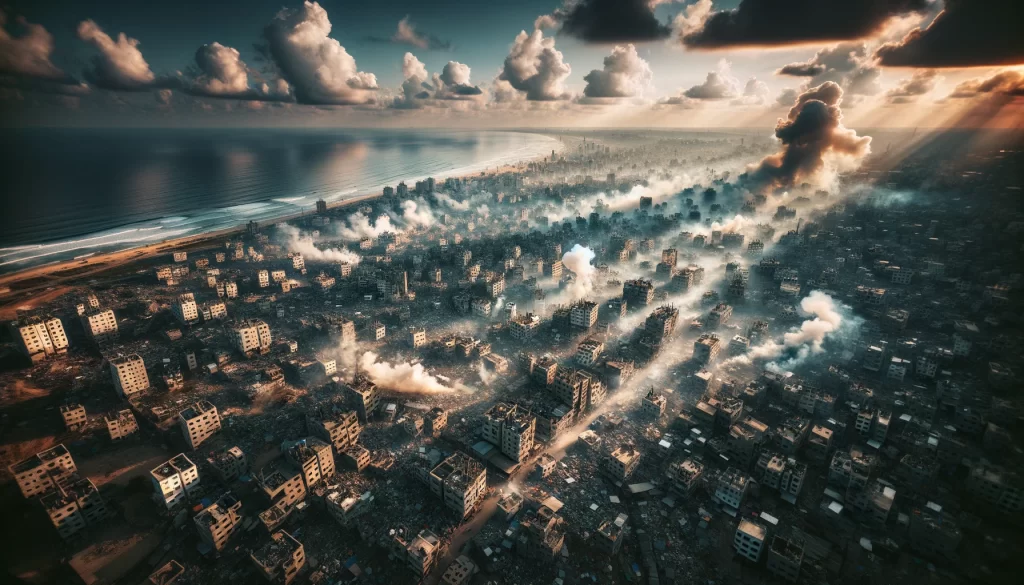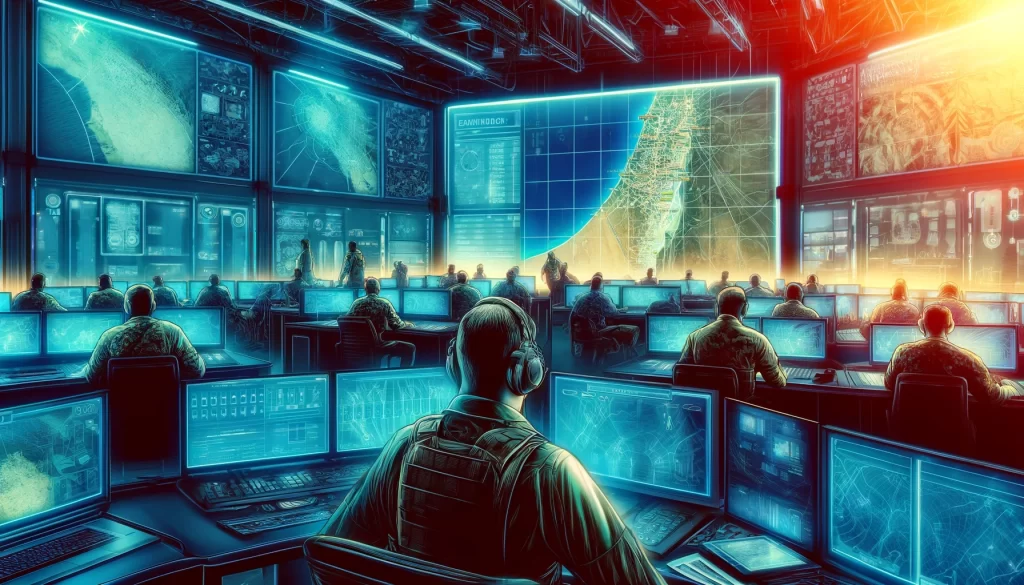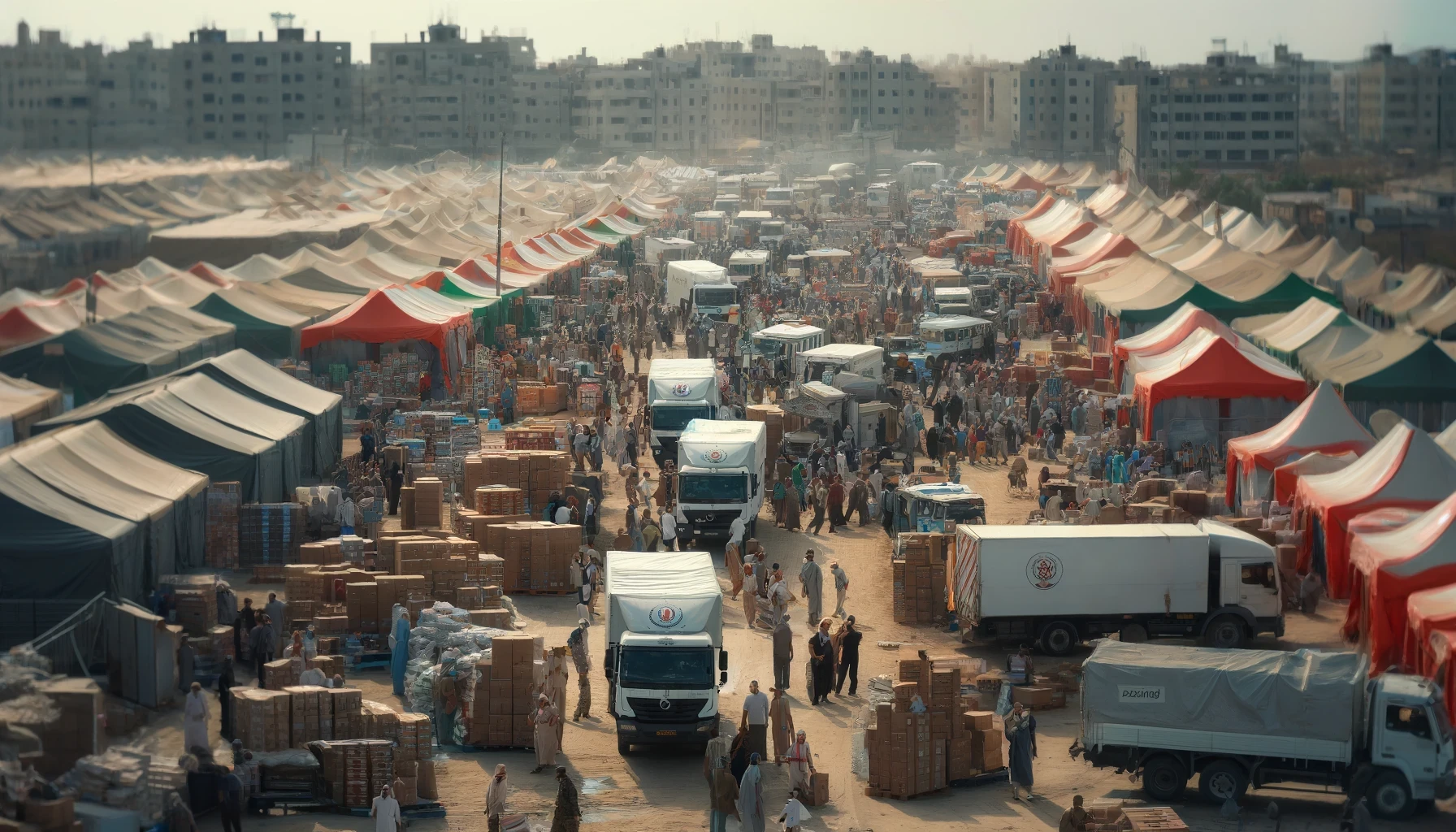Israel is rethinking its strategy in the ongoing conflict with Hamas following a significant warning from President Biden of the United States. President Biden has stated that the U.S. will stop sending weapons for offensive use if Israel’s military moves into Rafah, a city in southern Gaza home to over a million Palestinians.
Prime Minister Benjamin Netanyahu has not yet responded to this new stance from the U.S. However, Yaakov Amidror, a former national security adviser to Netanyahu, said that this warning was unexpected and has taken Israel by surprise. He noted that Israel’s war cabinet needs to decide whether to proceed with their plans to enter Rafah without U.S. support or to halt their operation, which would leave Hamas unharmed in that area.
This development highlights a growing public disagreement, especially after President Biden pointed out that U.S.-supplied weapons have been used in actions that resulted in civilian casualties. This issue arises amidst ongoing disagreements over how Israel has conducted the war and shaky cease-fire talks with Hamas in Cairo.
Hamas, on its part, has decided to continue negotiations in Doha, Qatar, sticking to a cease-fire plan it announced earlier, despite Israel’s actions which threaten these negotiations. Israeli officials have responded to President Biden’s comments by reiterating their commitment to disband Hamas’s forces in Rafah and to close off any routes for smuggling weapons across the Egyptian border.
Israel’s Foreign Minister, Israel Katz, emphasized on social media that Israel would persist in its efforts against Hamas, stating, “There is no war more just than this.” Similarly, Israel’s UN representative, Gilad Erdan, expressed disappointment with Biden’s decision, saying it could undermine Israel’s goal of overthrowing Hamas for a more stable future in the region.
Members of Netanyahu’s government have also shown strong reactions. Finance Minister Bezalel Smotrich declared that Israel would still aim for a complete victory in the conflict, despite the U.S. president’s restrictions. National Security Minister Itamar Ben Gvir was more provocative, suggesting on Twitter that Hamas favors President Biden, displaying the tension and frustration within Israeli politics.

Most recently, Netanyahu announced that Israel’s military had taken control of the border near Rafah, aiming to use military pressure to secure the return of hostages and to weaken Hamas. Since the conflict intensified with a Hamas attack on October 7, which killed about 1,200 Israelis and led to the capture of 253 hostages, Israel has been committed to dismantling Hamas.
The conflict has been deadly, with over 34,000 Gazans reported killed in seven months of fighting, a figure that includes both combatants and civilians. In a recent interview, President Biden commented on the severity of the situation, especially if Israel decides to advance into Rafah. He reiterated that the U.S. would not supply the heavy weaponry previously used in such operations.
Amidro commented that while Israel could keep fighting in Gaza, and potentially extend its military efforts into Lebanon, the lack of support from the United States could weaken Israel’s military readiness over time.
Amidror pointed out that it’s unclear whether President Biden’s statements were absolute or conditional on whether Israel could ensure the safety of civilians in Rafah, which the Israeli military has committed to doing.
Recently, the Israel Defense Forces (IDF) carried out a series of raids and airstrikes in Gaza City, targeting multiple sites described as military structures, tunnels used by militants, and other facilities linked to military activities. This operation was part of ongoing conflicts in the northern part of Gaza.
About 80,000 people have left eastern Rafah following these developments, as reported by the U.N. Relief and Works Agency, which is the main aid organization in the area. The Israeli military actions have temporarily closed the main entry points into southern Gaza, although one crossing, Kerem Shalom, was later reopened. Despite this, aid agencies have reported difficulties in getting supplies through.

There have also been incidents where Hamas has attacked the Kerem Shalom crossing, including a recent attack that resulted in the deaths of four Israeli soldiers.
The United States has been consistently urging Israel to allow more humanitarian aid into Gaza, especially since parts of the region are experiencing severe food shortages, with the World Food Program indicating a famine in the northern areas.
For a long time, the U.S. has stated that it would not support a large-scale Israeli offensive in Rafah without a solid plan to protect the over one million civilians sheltering there. The Israeli army has been discussing with U.S. officials and international aid organizations about relocating civilians to safer areas within Gaza, termed “humanitarian islands.” However, the U.S. administration has expressed that the plans presented so far have not been satisfactory.
Additionally, there have been disagreements between the U.S. and Israel regarding Israel’s long-term strategy for the conflict and plans for governing and rebuilding Gaza once the conflict ends.
A recent poll conducted by the Israel Democracy Institute in February showed that a majority of Israelis doubt that the government will achieve the “absolute victory” over Hamas that Netanyahu has promised.
This article is based on the following article:
https://www.washingtonpost.com/world/2024/05/09/biden-israel-weapons-rafah-attack

Background Information
This background should provide a foundational understanding for readers to grasp the complexities of the article and the broader geopolitical dynamics it discusses.
1. Israel and Hamas
- Israel: A country in the Middle East, established in 1948, known for its historical and religious significance to many cultures and religions. The modern state of Israel is often in conflict with Palestinian groups and neighboring countries over land and political sovereignty.
- Hamas: A Palestinian Islamist political organization and militant group that has controlled the Gaza Strip since 2007. Hamas is known for its resistance against Israeli occupation and has been designated as a terrorist organization by several countries, including the United States and the European Union.
- Gaza Strip: A small region on the eastern coast of the Mediterranean Sea that borders Egypt and Israel. Gaza has been under Hamas control since 2007, which has led to a blockade by Israel and Egypt due to security concerns.
2. Conflict Background
- The conflict between Israel and Hamas is part of a larger and long-standing Israeli-Palestinian conflict. This conflict has its roots in the 20th century with the establishment of the state of Israel and the displacement of many Palestinians.
- Key Issues: The conflict involves disputes over land, the right of return for Palestinian refugees, the status of Jerusalem, security, and mutual recognition.
3. U.S. Involvement
- The United States has historically been a major player in Middle Eastern politics and an ally of Israel. The U.S. provides significant military aid to Israel but also engages in diplomacy aimed at resolving conflicts in the region.
- President Biden’s Role: As mentioned in the article, U.S. President Joe Biden’s administration expresses concerns over military tactics and civilian safety, impacting U.S. military support for Israel.
4. Military and Humanitarian Issues
- Civilian Safety: In conflicts like the one in Gaza, ensuring the safety of civilians is a crucial international concern. International laws, such as those outlined by the Geneva Conventions, demand the protection of non-combatants in war.
- Humanitarian Access: Allowing humanitarian aid into conflict zones like Gaza is essential to prevent crises such as famines and medical shortages.
5. International Relations and Diplomacy
- Ceasefires and Negotiations: Temporary halts in fighting, known as ceasefires, are often negotiated to allow for diplomatic efforts and humanitarian aid. These are delicate and can fall apart if the underlying issues are not addressed.
- Global Opinion: International opinions on the Israel-Hamas conflict vary, with some countries supporting Israel and others sympathetic to the Palestinians. This division affects international diplomacy and responses.
6. Political Implications within Israel
- The political landscape in Israel is complex, with a wide spectrum of opinions on how to handle the conflict with Hamas. The government’s decisions can influence public opinion and electoral outcomes.
7. Media and Public Perception
- How conflicts are reported in the media can influence public perception and international response. The portrayal of military actions, civilian casualties, and peace efforts plays a significant role in shaping global and local opinions.
Please subscribe to Insight Fortnight, our biweekly newsletter!
